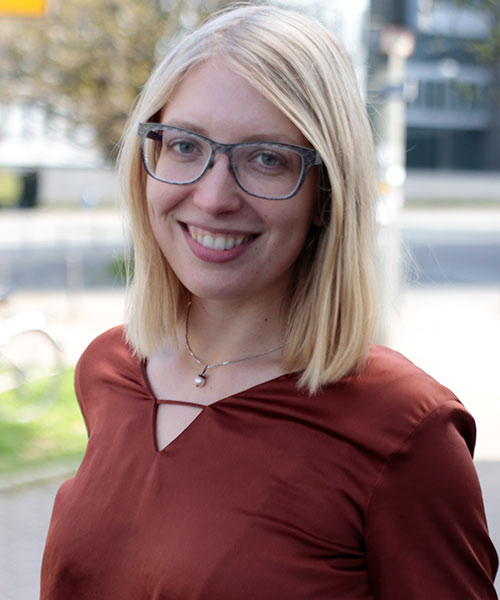Master of Economics
 Photo: Torsten Silz
Photo: Torsten Silz
Part-time Distance Learning
Economists study how the economic decisions of all kinds of players influence markets and entire economic systems. Their insights contribute to a better understanding of economic relationships. Study for a master’s degree in Economics at the FernUniversität in Hagen via distance learning and expand your professional horizons!
Master of Economics: Course Content
Economics examines the relationships between the decisions and actions of market participants in different markets at different levels – between companies and households within a country and also at supranational level. It therefore not only contributes to a better understanding of economic systems, but also provides the basis for drawing up the forecasts on which economic players or politicians base their decisions.
The master’s degree in Economics builds on your knowledge from a previous degree in economics. It consists of a compulsory and a compulsory elective part. In the former, for example, you will deepen your knowledge of econometrics, which combines business mathematics with statistics and economic models. In addition, you can specialize according to your interests and professional goals thanks to an extensive compulsory elective program – for example, by choosing modules on topics such as environmental and resource economics, stability policy, international finance, or taxation. While the focus here is on economics, you also have the opportunity to choose supplementary modules from related areas such as business administration or law in order to prepare yourself specifically for your future field of work.
Student testimonial on the M.Sc. in Economics
 Photo: FernUniversität
Photo: FernUniversität
“I really wanted to study economics, but I also wanted to continue working full-time at the same time. The FernUni was the ideal choice for me.”
Johanna Reinecke, M.Sc. in EconomicsFind out more
Career Prospects as a Master of Economics
The master’s in Economics qualifies you to take on demanding jobs or a management position in various areas, depending on which specialization you have chosen as part of your studies. Possible occupations include:
- Public administrations/parafiscal institutions
- Credit institutions, banks
- Environmental protection/environmental associations
Of course, a master’s degree in economics also opens the door to a career in research and teaching. The next step would be a doctorate.
Profile of the Master’s Degree in Economics
| Degree: | Master of Science (M.Sc.) |
| Type of study | Full-time study, part-time study, part-time distance learning (further education/continuing education), professional qualification with elements of classroom study and online study |
| Study duration: | 4 semesters full-time, part-time studies can be arranged to suit your circumstances |
| Scope: | 120 credit points (ECTS) |
| Start of studies: | Summer semester (April 1) or winter semester (October 1) |
| Enrollment deadlines: | 1 December to 31 January (for the summer semester) 1 June to 31 July (for the winter semester) |
| Costs: | €1,200 total costs for a full-time course in the standard study period. For part-time studies or a personalized period of study, the total costs increase by a further 60 euros basic fee per semester (plus student body contribution) |
Your benefits at a glance
- Maximum flexibility: You adapt your studies to fit your life – not the other way around.
- Recognized degree: the state-run FernUniversität in Hagen has been offering education at an academic level for around 50 years.
- Good support: The faculties at the FernUniversität in Hagen are particularly committed to providing students with intensive support during their studies.
- Good-value further education: There are no hidden costs involved with distance learning at the FernUniversität in Hagen. You always have full transparency.
- Location-independent & plannable: Modern, digital learning formats, study documents sent by post and much more. The dates for the (few) on-campus events are set well in advance. The campus locations are spread throughout Germany making them easily accessible for everyone.
Want to Know More?
Would you like to find out more about the master’s degree program in Economics as a (part-time) distance-learning course? Then take a look at the degree program web page provided by the Faculty of Business Administration and Economics. Here you will find further information on the structure of the course, the specific course content and the admission requirements.
Things You Should Know about the FernUniversität in Hagen
You can find answers to the most important questions and basic information about studying at the FernUniversität in Hagen here:
-
In terms of student numbers, the FernUniversität in Hagen is the largest state university in Germany . And it is the only state-run distance learning university. FernUni students can obtain an internationally recognized bachelor’s or master’s degree. Compact certificates complement our range. The flexible study system allows you to adapt your studies to suit your life situation. That's why we are exactly the right choice for the following people:
- Working professionals
- People bringing up families
- High school graduates
- Potential students with no high school diploma
- People with disabilities or chronic illnesses
- Students abroad
- Schoolchildren
- Competitive athletes
- Refugees
- Studying While Incarcerated
- Servicemen and women in the Armed Forces
-
No doubt, you have many questions: How does distance learning work? How do I learn? In what format are the exams held? When can I start studying? All the answers are gathered here for our students:
-
The Student Advice Service will help you make your decision about what to study at the FernUniversität. Here you will also find further information on how to organize your distance learning course.
If you have any specific questions about the master’s degree in Economics you can ask the faculty’s Student Advisory Service directly:
-
You can find out more about the requirements for any degree program by visiting the website of the relevant faculty. For more information on the master’s degree program in Economics, please contact the Faculty of Business Administration and Economics.
-
You can find all the relevant information on enrollment at the FernUniversität in Hagen listed here:
-
You can find advice and support close to your home at many locations in Germany, Austria, Hungary, and Switzerland. We also believe that helping students to network with other students is of key importance for later success.

